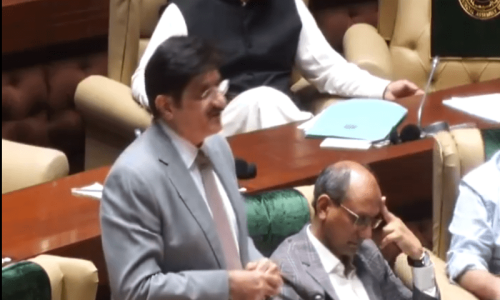HYDERABAD, Aug 30: Businessmen and shopkeepers are having a hard time this year as far as their Eid-related sales are concerned. Frequent strikes, prolonged electricity load-shedding, rains and a sense of insecurity created by political polarisation in Sindh – coupled with price hike and shrinking buying power of people -- have cast a negative impact on Eid shopping spree, depriving markets of the usual crowd of shoppers.
On Monday, rain lashed the city since afternoon, forcing customers to go home. On Tuesday, it started raining at 6:30pm when most of the people, who had not completed their Eid shopping, must be thinking of leaving home for shopping centres and bazaars, immediately after breaking fast.
The downpour must have dampened their spirit because Eid shopping is a family affair and it is too difficult to move in bazaars with your family amid showers. Hence, the usual hustle and bustle missing in shopping centres.
Traders say that they their business has been dealt a severe blow by oft-changing political situation in Sindh where political temperature continues to boil.
“We are having only 50 per cent of sales as compared to last year,” said Mohammad Zahid, who runs a hosiery shop on Lajpat road. According to him, customers are perhaps frightened by the political scenario in view of recent strikes within a short interval.
“We couldn’t get delivery of goods from Karachi last week as their arrival was delayed due to political situation,” he said.
Hyderabad, like other parts of Sindh, particularly Karachi, witnessed back to back strikes in second week of Ramazan when Eid shopping moves to its zenith.
Loadshedding during the first 10 days of Ramazan badly affected tailors’ business as they faced tremendous difficulties in meeting the deadlines.
“Our business reaches its peak in the last week of Shaaban and in the second week of Ramazan we are in top gear, meeting deadlines and giving full production. But this year the situation is different,” said Yusuf Lakhani, who owns a tailoring shop at Tilak Charhi.
“We didn’t have proper flow of customers this year due to strikes. Then rains made the customers disappear from markets,” he said.
“To make matters worse, loadshedding put tailors in a difficult position. How can we stitch clothes when there is no electric supply,” he said.
Mohammad Tahir, who deals in artificial jewellery in Resham Gali -- a shopping area popular among women belonging to middle and lower middle classes – said: “Compared to last year, we are having 50 per cent of business this year.
“Customers come here from every corner of the city like Latifabad, Qasimabad and rural areas of Hyderabad,” he said. But, he added, the customers this Ramazan were reluctant to visit bazaars out of fear caused by political strife.
According to Tahir, there was simply no business during the nine days of the month due to three strikes, three days of rains and three weekly holidays. “In the first week of Ramazan we don’t have post-Iftar business and it is always in second week when we keep shops open in the evenings,” he said.
But Ferhaj Khalid, owner of a shoe shop, is worried over security-related issues. “For me law and order breakdown and lack of security are major issues. The other day six drunkards entered my shop and made a fuss. We didn’t find a single policeman on the road where my shop is located and got police assistance only after hectic efforts.
“Such incidents diminish the already shaken business activity,” a disturbed Khalid said.
Windowpanes of his shop were smashed during one of the strikes when he opened the shop at Iftar timings after keeping it shut for whole day.
According to him, unchecked price hike has diminished people’s buying power. “We sold 100 pairs of shoes in Ramazan last year but this year we won’t be able to sell 70 pairs”, he said.
Mohammad Ali, a cloth merchant, said people of poor and lower middle class families preferred to meet their essential needs over Eid celebrations as they feared instability in the province that may last for several days if the situation gets out of hand.
“Price hike was there last year also but this year political circumstances have played a major role in keeping people away from markers. People, who are under tremendous psychological pressure, avoid visiting bazaars following frequent strikes,” he said.
He said that killings in Karachi had cast an impact on people’s minds. “After Dr Zulfikar Mirza’s Sunday press conference, parking area of our market got empty within minutes,” he said.














































Dear visitor, the comments section is undergoing an overhaul and will return soon.